May 6, 2024 | 10:12 GMT +7
May 6, 2024 | 10:12 GMT +7
Hotline: 0913.378.918
May 6, 2024 | 10:12 GMT +7
Hotline: 0913.378.918
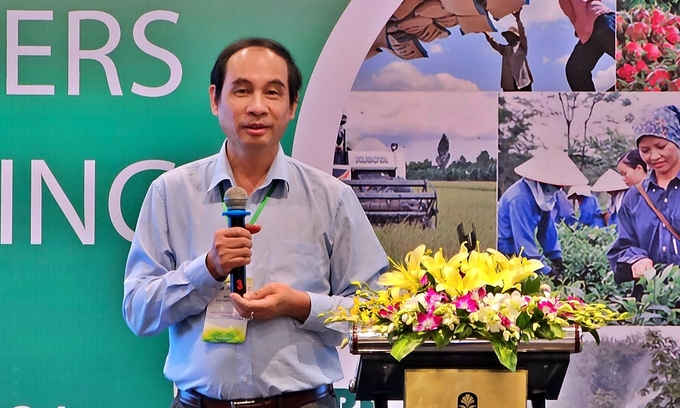
According to Dr. Dao The Anh, preserving indigenous genetic resources means preserving biodiversity.
"To transform the food system, we need to provide more information to future generations, from methods of preserving and restoring indigenous varieties to disseminating information on biodiversity conservation," Dr. Dao The Anh said on the sidelines of the NATURE+ Partners Meeting in Vietnam on April 23.
According to the Deputy Director of the Vietnam Academy of Agricultural Sciences (VAAS), biodiversity conservation is one of many ways to build a sustainable food system because this activity is often associated with food production, the most important step to constitute the food system.
Vietnam is one of the 16 countries with the highest biodiversity in the world. Biodiversity plays an important role in human survival and development. In the agricultural sector, biodiversity ensures nutritious meals and diverse diets for children and preserves and restores rare indigenous genes.
However, due to the 'hot' development pursuing agricultural output for many years, food production systems in localities, especially regions such as the Northwest, Central Highlands, and Mekong Delta, are currently less diverse and do not provide enough quality and quantity to consumers.
"The rate of malnutrition among children in mountainous and remote areas is relatively high. If indigenous varieties that are highly nutritious and adapt well to climate change can be developed, people will have many options to solve the problem on the spot," said Mr. Dao The Anh.
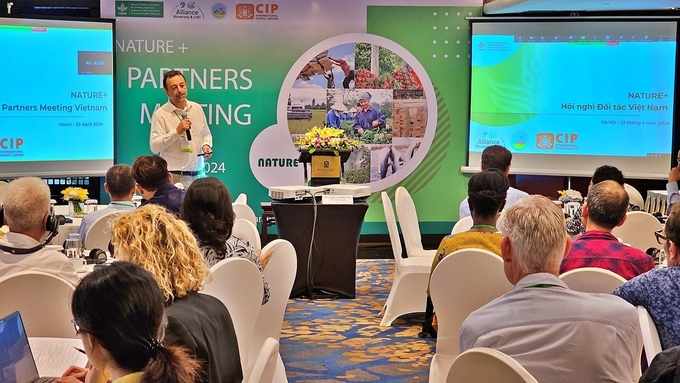
Dr. Diego Naziri from the International Potato Center (CIP), the focal point of NATURE+ in Vietnam.
The VAAS leader said that to build a sustainable food system, in addition to ensuring the quantity and quality of food sources, it is also necessary to pay attention to consumers' accessibility.
In the field of biodiversity conservation, specifically the preservation and development of indigenous genetic varieties, people need to learn how to preserve them through regular use. He called on the government and management agencies to encourage people to participate more in the exploitation and use of indigenous resources.
In addition, research institutes and technical support units also need to research, select, and create varieties suitable for each actual condition and have corresponding instructions.
Currently, many localities are concerned about this issue. Some schools have proactively associated with and participated in models to quickly disseminate and provide information to students about biodiversity conservation. However, Dr. Dao The Anh wishes that these activities would be stronger.
Along with disseminating knowledge, localities need to establish and build clubs on healthy food consumption, as well as processing methods that ensure nutrition and flavor for indigenous foods.
"The NATURE+ Partners Meeting emphasizes the integration of multi-value in agriculture, promoting circular agriculture, and taking advantage of wastes and by-products such as coffee grounds and fruit peels," said the Deputy Director of VAAS.

Children experience conservation work at Cuc Phuong National Park.
Dr. Diego Naziri from the International Potato Center (CIP), the focal point of NATURE+ in Vietnam, said that in the past, the food system had a strong impact on nature by causing 80% of deforestation, 37% of greenhouse gas emissions, 86% of species extinction, and 70% global water resource depletion.
In Vietnam, unsustainable agricultural practices also cause many agricultural land areas to be degraded and pollute the environment. The situation has become more serious in recent years due to land fragmentation and the limited development of value chains.
To thoroughly solve the problem, the Government has issued a National Action Plan to Transform a Transparent, Responsible, and Sustainable Food System in Vietnam for the 2021–2030 period. At the agricultural sector level, Dr. Diego proposed two solutions: strengthening nature-positive measures and enhancing the responsibility of farms and the community.
According to his explanation, nature-positive agriculture is characterized by the regenerative, non-depleting, and non-destructive use of natural resources based on environmental and biodiversity management such as carbon sequestration, regulating soil, water, and climate.
Meanwhile, producers (farms) and consumers (the community) need to join hands to ensure the actual costs of food are accurately accounted for. That could be strengthening rural waste management, using more of a network of local retailers, or prioritizing the use of products with public and transparent information.
According to NATURE+'s focal point in Vietnam, the initiative will be implemented in Co Noi, Chieng Luong, and Chieng Chan communes (Mai Son district, Son La province) and Muong Hoa, Thanh Binh, and Ngu Chi Son communes (Mai Son district, Son La province).
"We will jointly discuss the progress of cooperation between CGIAR and national partners, including sharing successes, challenges, and experience lessons. In addition, the plan by the end of 2024 should also be implemented soon to increase integration between components," said Dr. Diego.
NATURE+ is an initiative of the Consultative Group on International Agricultural Research (CGIAR). The goal of the initiative is to rebuild the image, co-create, and develop agricultural and food systems based on environmentally friendly solutions to ensure local livelihoods and food security while still maintaining a positive and friendly contribution to nature.
The main activities of the initiative include: agricultural biodiversity conservation; biodiversity, land, and water management; increasing capacity for recovery and resilience; offering nature-friendly recycling solutions; and building a favorable environment so that stakeholders can have environmentally friendly solutions.
NATURE+ is implemented in five countries globally, including Vietnam, Burkina Faso, Colombia, India, and Kenya. In Vietnam, the initiative started in 2022 and is divided into five components.
Translated by Thu Huyen
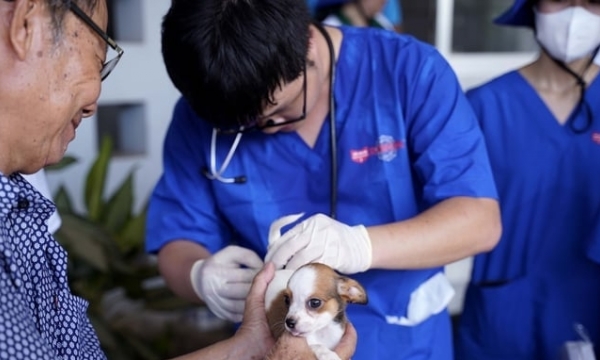
(VAN) Pet owners in Long An province exhibit indifference and a lack of understanding regarding rabies. They maintain the misconception that pet dogs and cats are immune to the disease.
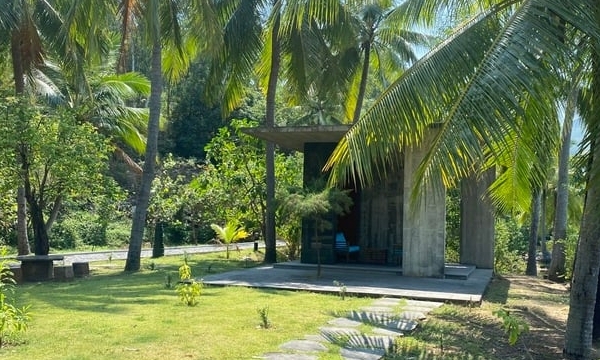
(VAN) The STAR-FARM project is funded by the European Union and implemented in the provinces of Dong Thap, Kien Giang and Tra Vinh, with a total investment of 4.2 million Euro.
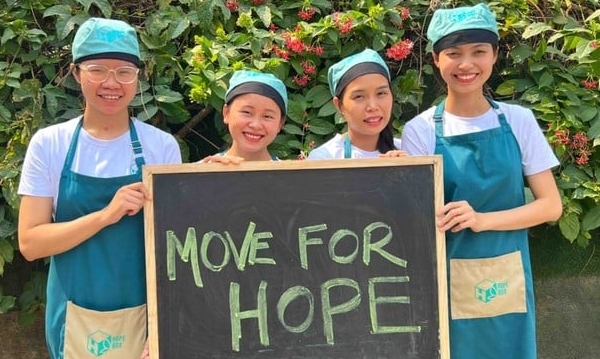
(VAN) The ecosystem and social impact business organizations (SIBs), although still modest in number, is very diverse and dynamic, they have been creating positive changes in many aspects, contributing to building a sustainable future
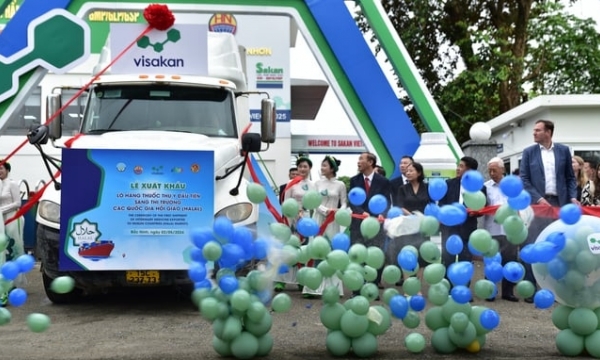
(VAN) Visakan Biotechnology Development Investment Company, a subsidiary of Hung Nhon Group, recently held a ceremony to commemorate its first export shipment of veterinary medicine to the Halal market.
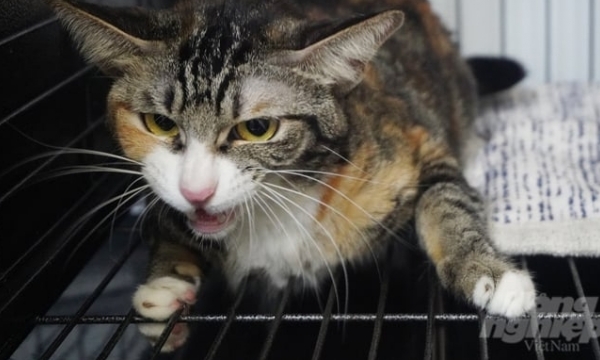
(VAN) If temporary regulations on dog and cat ownership are approved, Ho Chi Minh city will pilot the implementation of microchipping for dogs and cats in several designated areas within the inner city.
/2024/05/02/5303-5730-6-185654_281.jpg)
(VAN) Dr. Pham S, Vice Chairman of Lam Dong Provincial People's Committee: 'Lam Dong has attracted 80 FDI enterprises and 1,550 domestic enterprises to invest in agricultural development, with 150 agricultural cooperatives applying high technology'.
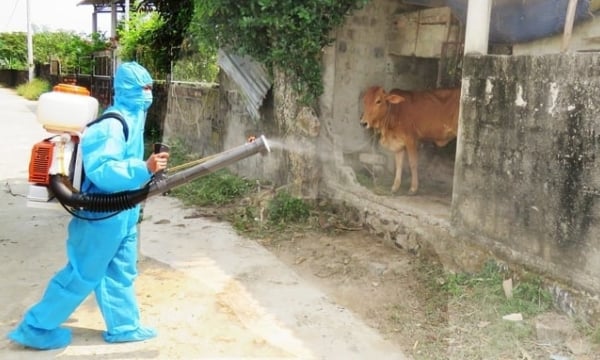
(VAN) An outbreak of Lumpy Skin Disease has occured across four districts in Quang Binh province, prompting local veterinary forces to strengthen prevention efforts.